Cruel, but Not Unusual: The Increasingly Frequent Practice of Failing to Evacuate Prisoners During Natural Disasters
Elizabeth Spitzenberger
Fordham ELR Staffer (Grad Year 2026)
Recently, back-to-back hurricanes Helene and Milton devastated areas of the Southern United States from the Gulf Coast to Appalachia. While many residents heeded mandatory evacuation orders and fled their homes in anticipation of the storm surge, thousands of incarcerated people had no choice but to remain in their cells and ride out the storm.1 Local authorities in several Florida counties in Hurricane Milton’s direct path chose not to evacuate their jails despite regional leaders warning of the life-threatening risks of choosing to ignore evacuation orders.2 This recent example of disregard for prisoners’ safety evokes questions of the legality of such decisions in circumstances increasingly exacerbated by climate change.3
Refusing to evacuate prisoners during natural disasters is nothing new in this country. In the days preceding Hurricane Katrina, the Orleans Parish sheriff insisted that prisoners would remain “where they belong” despite mandatory evacuation orders, leading to inmates, including incarcerated children, going days without food, water, ventilation, or electricity in cells of chest-high contaminated water.4 Refusals to evacuate echoed at Rikers in 2011 during Hurricane Irene,5 at Texas correctional facilities in 2017 during Hurricane Harvey,6 and across Virginia and the Carolinas in 2018 during Hurricane Florence.7 In August 2020, California authorities refused to evacuate two state prisons within a mandatory evacuation zone north of San Francisco as wildfires raged dangerously close to the facilities.8 Heatwaves often turn deadly in prisons, leading to predictable and preventable deaths of prisoners in facilities without air conditioning.9 When authorities do make the rare choice to evacuate prisoners facing extreme weather events, prisoners are often moved into already overcrowded facilities with disregard for inmate classification systems, leading to increased assaults and safety and health concerns for those incarcerated.10 Each of these examples illustrate authorities’ disregard for prisoner safety during these increasingly frequent and extreme disasters.
The Eighth Amendment of the Constitution is meant to protect people from cruel and unusual punishment at the hands of the state. This imposes a duty on prison officials to provide humane conditions of confinement, including adequate food, shelter, and reasonable measures to ensure the safety of inmates.11 Although this would indicate that prisoners facing obscene conditions due to refusal to evacuate during natural disasters have actionable claims under 42 U.S.C. § 1983, it remains difficult for prisoners to prevail in these petitions.12 In order to successfully challenge the conditions of their confinement, inmates must show that officials failed to act reasonably with the knowledge of the risk to meet the deliberate indifference standard.13 Alternative causes of action exist under the Americans with Disabilities Act, the Post Katrina Emergency Management Reform Act, and the National Environmental Policy Act, but successfully framing claims under these statutes remains a challenge for prisoners.14
This year’s hurricane season has already proven more work needs to be done to protect the most vulnerable populations during natural disasters. Prison labor fills sandbags before floods15 and fights wildfires,16 yet officials abandon them in mandatory evacuation zones with impunity. Such disregard for human life and living conditions has no place in the adaptation to climate change, and hopefully, our nation’s leaders will recognize the crucial need for legal repercussions for failure to prevent such unnecessary suffering.
- https://theappeal.org/hurricane-milton-florida-jails-prisons-evacuations/ ↩︎
- https://www.motherjones.com/politics/2024/10/hurricane-milton-florida-jail-inmates-not-evacuated-safety-warnings/ ↩︎
- https://www.npr.org/2024/10/08/nx-s1-5143320/hurricanes-climate-change#:~:text=Are%20hurricanes%20becoming%20more%20frequent,and%20more%20severe%20storm%20surge.
https://www.motherjones.com/politics/2024/10/hurricane-milton-florida-jail-inmates-not-evacuated-safety-warnings/ ↩︎ - https://www.aclu.org/press-releases/aclu-report-details-horrors-suffered-orleans-parish-prisoners-wake-hurricane-katrina ↩︎
- https://www.motherjones.com/criminal-justice/2011/08/rikers-island-prisoners-irene/ ↩︎
- https://www.motherjones.com/criminal-justice/2017/11/we-didnt-have-to-suffer-like-that-inside-a-texas-prison-during-hurricane-harvey/ ↩︎
- https://www.motherjones.com/criminal-justice/2018/09/thousands-of-prisoners-are-being-forced-to-stay-during-hurricane-florence/ ↩︎
- https://www.theguardian.com/us-news/2020/aug/21/california-fires-prisons-covid-outbreaks ↩︎
- https://newsroom.ucla.edu/releases/predictable-and-preventable-heat-deaths-in-prisons ↩︎
- https://www.aljazeera.com/news/2021/12/8/how-prisons-in-a-us-state-botched-wildfire-evacuations ↩︎
- Farmer v. Brennan, 511 U.S. 825, 832 (1994). ↩︎
- https://scholarship.law.duke.edu/cgi/viewcontent.cgi?article=1296&context=dlj ↩︎
- http://columbiaclimatelaw.com/files/2018/05/Omorogieva-2018-05-Prison-Preparedness-and-Legal-Obligations.pdf ↩︎
- Id. ↩︎
- https://www.aclu.org/files/pdfs/prison/oppreport20060809.pdf ↩︎
- https://theintercept.com/2022/02/12/wildfires-prisons-climate-california/ ↩︎

